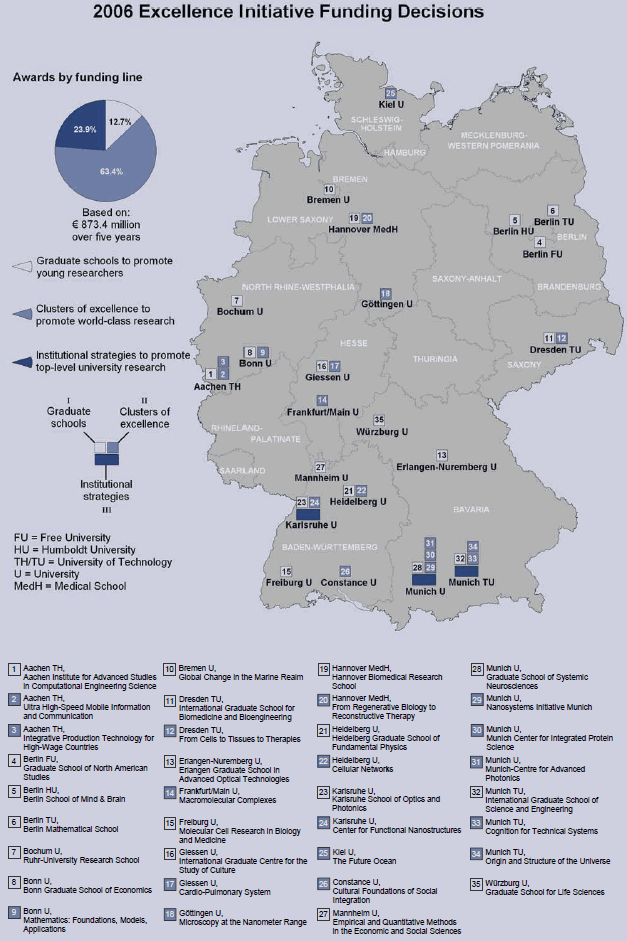|
|
|
|
|
|
|
News & Views item - October 2006 |
![]() Funding Decisions in the German Government’s Excellence Initiative for Research
Universities Announced. (October 15, 2006)
Funding Decisions in the German Government’s Excellence Initiative for Research
Universities Announced. (October 15, 2006)
In January 2004 TFW reported, "German Chancellor Gerhard Schröder's Social Democrats' recent publicising of proposals to set up a small number of elite universities similar to Harvard, Stanford, Oxford or Cambridge, has met with a mixed reception," Nevertheless, "the German higher education system has been in financial straits for some time with the recent [2004] rankings by Shanghai Jiao Tong University's Institute of Higher Education placing the top five German universities 48, 58, 60, 91, and 95 in the top 100."
By February 2005 matters were looking rather grim. Nature reported that events were at a standstill:
The programmes designed last year to create world-class centres in German universities and research institutes may fall victim to the chronic battles for power between federal and regional governments. Both sides had agreed to support the programmes, and the money — €390 million [A$653 million] per year from 2006 to 2010 — had been set aside. Shamefully, the bickering has led to the programmes being put on ice.
The irony is that the impasse is a result of an attempt to undo the Gordian knot of federalism in Germany by loosening the jealously guarded powers of the regions. The attempt has failed dismally. Forlornly, one can only hope that the politicians will learn that science and other key areas are the ultimate victims of their power games.
But with Angela Merkel assuming the Chancellorship of Germany on November 22, 2005, heading a "Grand Coalition" and her promise that "...we want to strengthen institutions and academics that are particularly outstanding and creative and also network successfully. By 2010, we aim to increase spending on R&D to 3% of gross domestic product. Science and research will be one of the priorities of Germany's European Union (EU) presidency."
On Friday, October 13, funding decisions in the German government’s Excellence Initiative were announced. A total of €873 million (A$1.45 billion) has been awarded for a five-year period in the programme’s three lines of funding: 12.7% to graduate schools, 63.4% to clusters of excellence and 23.9% to institutional strategies to promote top-level research. Karlsruhe University of Technology, the University of Munich and Munich University of Technology were awarded funding in all three lines. Selection in this rigorous competition was based on decisions made by a joint commission installed by the DFG and the German Science Council, and a grants committee consisting of members of the joint commission and federal and state research ministers. The initiative aims to promote science and research at German universities.
Science's Gretchen Vogel reports, "Many feel the money is perhaps less important than the bragging rights the award bestows in the competition for top professors and other outside funding," and, The results quieted the fears of some critics who predicted that the money would flow based on political calculations--such as making sure winners were spread evenly across the country--instead of academic criteria. Indeed, [the October 13] meeting between 26 scientific reviewers and the state and federal science ministers apparently was a tense one, with the politicians complaining that the scientists gave them no voice in the final decision. Although there were scattered winners in Berlin, Hanover, and Kiel, most of the funding will flow to schools in the southern half of the country. Federal science minister Annette Schavan called the vote "a sign of confidence from the politicians" in the scientists' judgement."
It also mayn't have hurt that Chancellor Angela Merkel holding a doctorate in physics and having done research in quantum chemistry has shaped her appreciation of the roles of universities and research in Germany's future.
Competition for a second round of funding of €1 billion is already underway. Next October, up to seven more universities could join the winners in Munich and Karlsruhe in the initiative's most prestigious category.
